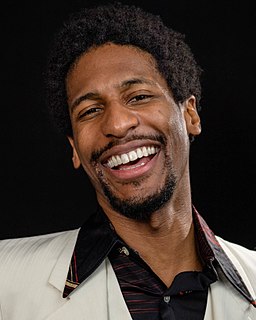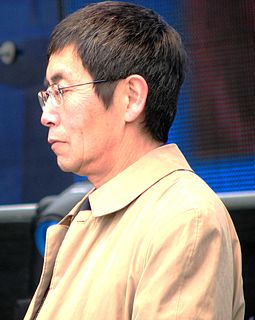A Quote by Bernadine Dohrn
I think the Sixties in some ways is a barrier to young people today. They think of it, you know, what we're doing is not that. But it's partly the myth of the Sixties. It always felt embattled and small. It always, almost always, was a small group of people relative to the opposition around.
Related Quotes
The serve, I was too young and too small and... not enough powerful to have a good serve when I was young, so my forehand was always my signature shot. So I used to always run around my backhand, you know, use my forehand as much as I could, and so that's why I think it's my strength also today, you know.
I always want to be doing both to travel as a teacher and lecturer, and to be a musician. I think in this generation institutionalizing the art form and spreading it to the younger generation through education is really important for all artists to have some hand in. Right now in popular culture and the mainstream, it's not a big part at all. I think education by young artists talking to young people, not just older people talking to young people, it gives an experience never felt before. I think over the years it will do a lot for the music.
I've had the same friends I've always had. I mean, I've lost a few over the years. Hate to use the word "success," but I don't know what else to say, but some people are more affected by that than others. I've had the same core group of friends that I've always had. We're surfing, so that definitely keeps you grounded. Just when I think I'm cool because we're playing these massive shows or having some sort of commercial success, I can always be reminded how small I am when I try to surf a wave that's a little bit out of my league, and I just get pummeled.
I didn't feel that so much as an outsider when I started writing; I've felt that way all my life. I don't know, man; I guess I was just wired wrong. When I was growing up, I always wanted to be somebody else and live somewhere else. I've always felt a little uncomfortable around people. And I'm not trying to romanticize this, because it wasn't romantic. I wasn't trying to be a rebel; I just always felt a little out of it. I think that's why it's pretty easy for me to identify with people living on the margins.
There is a lot of sixties-bashing going on these days that I don't agree with at all. I feel that extremely important ideals were brought to the forefront of the collective consciousness at that time. Granted, drug use was so pervasive that our generation did not as a group have the capacity to manifest our ideals to any great extent. But many of the people who were young in the sixties and who were most touched by that collective ethos are still touched.
I always felt like Tahliah's a very grown-up name to have. It's a pretty name when you're young, and then I think when I became a young lady, it felt kind of like a lot to grow into for some reason. I don't know. It sounds kind of regal. I never really liked it. I always felt like I couldn't live up to it.
You know how some people are upwardly mobile? I'm sort of downwardly mobile in the publishing world, because of my sales figures and also because of the kind of books I write. Everything really counts on sales. I started out with a bigger press, my first few books. But I've always done some things with independent and small presses and small magazines and I always will.
Photography has almost no reality; it is almost a hundred per cent picture. And painting always has reality: you can touch the paint; it has presence; but it always yields a picture - no matter whether good or bad. That's all the theory. It's no good. I once took some small photographs and then smeared them with paint. That partly resolved the problem, and it's really good - better than anything I could ever say on the subject.




































